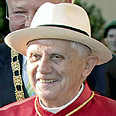
Thus, the pope is "extremely upset that some portions of his speech were able to sound offensive to the
sensibilities of Muslim believers and have been interpreted in a way that does not at all correspond to his intentions," Bertone said in a statement.
The words, in a speech Benedict gave to university professors earlier in the week during a pilgrimage to his homeland, angered many in the Islamic world and raised doubts over whether a planned trip to predominantly Muslim Turkey in late November would go ahead.
Leaders across the Muslim world in the last few days have demanded the pope apologize for his remarks on Islam and jihad, or holy war, despite earlier Vatican's assurances that he meant only to emphasize the incompatibility between faith and war.
Benedict cited in a recent speech an obscure Medieval text that characterizes some of the teachings of Islam's founder as "evil and inhuman" - comments some experts took as a signal that the Vatican was staking a more demanding stance for its dealings with the Muslim world. When giving the speech, the pope stressed that he was quoting words of a Byzantine emperor and did not comment directly on the
"evil and inhuman" assessment.
Cardinal Bertone, referring to the emperor's assessment, said that "the Holy Father absolutely didn't intend nor intends to make it his own (assessment) but has only used it as an occasion to offer, in an academic setting and, as can be seen from a complete and careful reading of the (pope's) text, some reflections on the subject of the relationship between religion and violence in general and to conclude with a clear and radical refusal of religious motivation for violence, from whatever side it comes from."
Nablus attacks
Two West Bank churches were hit by firebombs early Saturday, and a group claiming responsibility said it was protesting what many Muslims view as disparaging remarks about Islam by the Pope.
Relations between Palestinian Muslims and Christians are generally peaceful, and the attacks on an Anglican and a Greek Orthodox church in the West Bank city of Nablus sparked concern about sudden tensions. Clergy played down the attacks as isolated incidents, but said they'd worry if more Christian sites are targeted.
On Friday, two small explosions went off near a Greek Orthodox church in Gaza, causing minor damage. "It is easy to worry," Father Yousef Saada, a Roman Catholic priest in Nablus, said Saturday. "The atmosphere is charged already, and the wise should not accept such acts."
Ayman Daraghmeh, a legislator from the ruling Islamic Hamas group, denounced the attacks, and urged
Palestinian police to do more to protect Christian sites. The firebombs left black scorch marks on the walls and windows of the two Nablus churches. At least five firebombs hit the Anglican church.
In a phone call to The Associated Press, a group calling itself the "Lions of Monotheism" claimed responsibility. The caller said the attacks were carried out to protest the pope's remarks about Islam. During a speech earlier this week, Benedict had cited an obscure Medieval text that characterizes some of the teachings of Islam's founder as "evil and inhuman." The pope, spiritual leader of more than one billion Roman Catholics, did not explicitly agree with or repudiate the text.
On Friday, about 2,000 Palestinians protested against the pope, accusing him of leading a new Crusade against the Muslim world. Palestinian Prime Minister Ismail Haniyeh of Hamas said the pope offended Muslims everywhere.
Bishop Riah Abo El-Assal, the top Anglican clergyman in the Holy Land, said Saturday he expected his Muslim colleagues would swiftly denounce the attacks on the churches.
Abo El-Assal brushed aside the attacks as "childish acts" And said he was not increasing security at the Anglican churches in the area. In Nablus, merchant Khaled Ramadan, 31, wearing traditional Islamic garb, said the pope's comments were unforgivable, but that Palestinians must not fight among themselves.
"We are one people and violent reactions like these should not happen here," he said.















